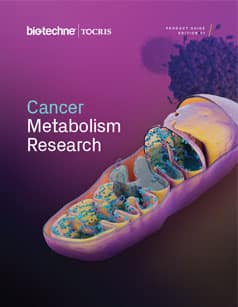Fatty Acid Synthase
Fatty acid synthase (FASN), EC 2.3.1.85, is a multienzyme that catalyzes the conversion of acetyl-CoA and malonyl-CoA to the 16-carbon fatty acid palmitate. FASN overexpression and hyperactivity is commonly associated with malignant cells.
Fatty Acid Synthase Inhibitors |
|
|---|---|
| Cat. No. | 产品名称/活性 |
| 2489 | C 75 |
| Potent fatty acid synthase inhibitor; proapoptotic | |
| 5303 | GSK 2194069 |
| Potent human fatty acid synthase (hFASN) inhibitor | |
| 3540 | Orlistat |
| Inhibits the thioesterase domain of fatty acid synthase; also carboxylester lipase inhibitor | |
Fatty acid synthase (FASN), EC 2.3.1.85, catalyzes the final stage of de novo fatty acid (FA) synthesis, that is the conversion of acetyl-CoA and malonyl-CoA to the 16-carbon FA palmitate. FASN is a multienzyme, exhibiting the catalytic properties required for palmitate synthesis including synthase, transferase, dehydrase, reductase and thioesterase activity, in addition to NADPH binding.
Expression and activity levels of FASN in normal tissues are typically low, being highest in hormone-sensitive tissues such as the endometrium and mammary glands, as well as during embryogenesis. However FASN is commonly overexpressed and hyperactive in a number of malignancies, where a high rate of de novo FA synthesis is required to meet the needs of rapidly proliferating cells.
The majority of normal adult cells utilize exogenous dietary FAs for their metabolic needs; FASN activity is required to convert excess dietary carbohydrate to FAs, which are esterified and stored as triacylglycerols. In cancer cells however, lipid metabolism is altered and is dependent on continuous de novo FA synthesis for cell proliferation and survival. Therefore enhanced FASN expression and activity is an important component of cancer metabolism. Growth factors and steroid hormones can both stimulate intracellular signaling pathways that induce FASN gene expression in cancer cells. For example, the PI 3-K-Akt and ERK1/2 signaling pathways induce FASN expression through activation of the transcription factor SREBP-1.
Due to the relatively low FASN expression and activity in normal cells in contrast to its hyperactivity and overexpression in cancer cells, along with the reliance of malignant cells on de novo FA synthesis, FASN is a promising therapeutic target for cancer therapy. Inhibition of FASN has been shown to cause cell cycle arrest, reduce cell proliferation and induce apoptosis in a wide range of cancer cells, while having no effect on normal cells. It has also been demostrated in vivo that FASN inhibition attenuates the growth of tumors in multiple xenograft models in mice.
External sources of pharmacological information for Fatty Acid Synthase :
Literature for Fatty Acid Synthase
Tocris offers the following scientific literature for Fatty Acid Synthase to showcase our products. We invite you to request* your copy today!
*Please note that Tocris will only send literature to established scientific business / institute addresses.
Cancer Metabolism Research Product Guide
This product guide reviews some of the main areas in cancer metabolism research and lists around 150 products that can be used to investigate metabolic pathways in cancer including:
- Glycolysis
- Tricarboxylic Acid Cycle
- Lipidogenesis
- 1C Metabolism and Nucleic Acid Synthesis
- Drivers of Metabolic Reprogramming
- pH and Redox Balance
